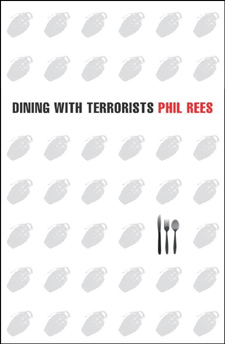"Terrorism" is a notoriously difficult word to define, and yet the times in which we live demand a clear view of good and evil. To fight terror is, in George W. Bush's mind, "the inescapable calling of our generation": but this may be more complicated than it seems. After all "terrorist" is a word that once described Nelson Mandela, one of the greatest of secular saints and a winner of the Nobel Peace Prize. Is it merely a word that governments use to describe those who oppose them illegally? In which case, is terrorism sometimes justified, if it is against a government that acts immorally?
Phil Rees plunges into this quagmire in his disturbing book Dining with Terrorists. What he seeks to do is certainly controversial: to meet men and women accused by others of terrorism - even to eat with them " and to try to understand their point of view. He is well aware that to do so makes him, in the minds of some, complicit in their evil. In giving voice to their ideology, he knows that he risks being seen as an apologist for some of the most sinister extremes in human behaviour.

And so he seeks out Basque separatists, Serb nationalists and their Kosovar Albanian foes, Colombian coca farmers, Irish Republicans and Tamil Tigers; and he has sought to discover what motivates those who commit terrible violence. In places as diverse as Algeria and Cambodia, Rees asks, apparently without prejudice, "why do you do it? Explain to me your cause." There is not one clear theme to the answers that emerge; but the sheer glassy-eyed conviction of those with whom he speaks is chilling. The inability to see from the other's point of view is endemic amongst Rees' subjects: "they" " whoever the terrorist opposes - are always to blame, it seems. However, Rees himself is committed to the belief that an understanding of the other's point of view is essential for surmounting violence: no matter how problematic that other might be.
Part of his mission is to show how loaded the term "terrorist" has become, especially since September 11, 2001. The word has become an instrument of government control - an abuse word rather than a helpful description. For Rees, "if we don't want to describe America and Britain as terrorist nations, the only principled alternative is to purge the word from the lexicon of journalism" (p.366). Certainly, it is worth asking whether much separates the means that western nations have used to counter what they call "terrorism" and the means used by those terrorists. Is the aerial bombardment of a city not an act of terror? Over and again the Islamists that Rees interviews call George W. Bush and Tony Blair terrorists: it is difficult to find a definition of "terrorism" that gets them (and us) off the hook, frankly.
In a revealing passage Rees writes:
I also wished I had met Osama bin Laden. I was privileged to witness history unfold from the mid-1980s onwards: amongst it, the fall of communism in Europe, the Tiananmen Square massacre, the Gulf War, the break-up of Yugoslavia. I have seen violence used by nations and rebels, each in the name of righteousness. Whether or not bin Laden was evil would not have been my starting point. I wanted to know what made him tick. Why had he become the man he was? Why were young Muslim men willing to join him in battle and die for their faith? (p.319)
Rees is an observer, with a true journalist's commitment to objectivity, refraining from quick or glib judgement. "What makes a terrorist tick" is a question our world badly needs to answer, and yet most of the media hasn't displayed the moral courage that Rees has shown in risking contamination by the views of those who practice (apparently) random acts of violence.
What Rees isn't necessarily interested in is whether the there is any substantial difference in the rightness of the cause for which both sides struggle. Rees rightly reminds us how complicated the business of making judgments about right and wrong is, especially when individual acts are overlaid with the forces of history. But the challenge of September 11 is this: is what we call the "Western" way of life actually superior to others or isn't it? Do the "values" that Western societies have learnt from two millennia's contact with Christianity - freedom, equality, mercy in judgement, human rights " make for a right cause to defend, something for which it is good to struggle? Or is the West somehow partly to blame for the rise of the terrorism that opposes it? Complex these matters may be, but that does not absolve us from the need to make judgments as best we can. Moral and cultural relativism are just amusing classroom games: they have no future once suicide bombers are an element in the equation.
The answer to all the questions in this last paragraph, I believe, is "yes". Ultimately the clear-sightedness needed for perfect justice is not given to human beings, except in hope ahead of God's own judgment. In the meantime, we ought carefully to consider Rees' suggestion about dropping the word "terrorist", which is so fraught with condemnation: for it demonises the other, while concealing our own complicity in wrong-doing.






















